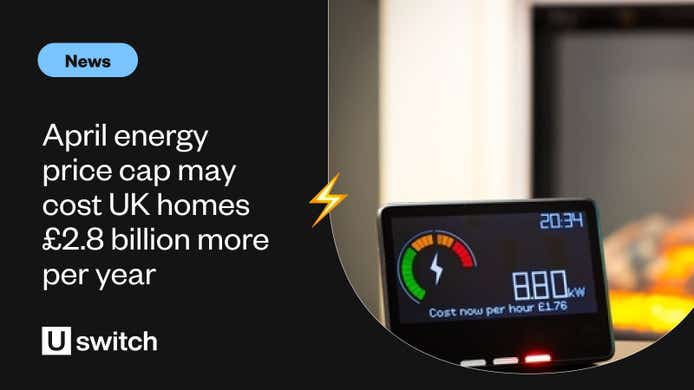Home
Energy comparison
Potential savings of £200*
Energy comparison
Compare energy prices to unlock big savings now.
-
Energy prices will drop in July, but fixed deals will still offer bigger savings
-
If you're not on a fixed energy deal, ditch the price cap - you could save £200* by fixing
-
It only takes 6 minutes** to switch energy and start saving
Jump to section
Not on a fixed deal? Learn how the price cap affects you and why it's a good idea to switch.
Discover how quick and easy the energy switching process is with our step-by-step walkthrough.
See which suppliers we compare, from household names to emerging brands.
If you're struggling with your energy bills, find out which help schemes are currently available.
Should I switch my energy deal?
The price cap increased to £1,849 on 1 April, meaning energy prices will stay high until at least July. It will change twice more in 2025. It will drop to £1,720 from July but it's difficult to predict what will happen further into the future.
If you're on a "variable" or "default" tariff: you can almost certainly save by switching to a fixed deal or tracker tariff. See your potential savings by comparing energy prices now.
If you're on a fixed tariff with more than 49 days left on your contract: you'll probably have to pay an exit fee to leave your contract early. You can switch but it might be worth staying put for now.
If you're on a fixed tariff with less than 49 days left on your contract: you can switch now without paying exit fees. You should look at getting a new fixed deal to avoid being rolled onto an expensive standard variable tariff.
Uswitch works hard to offer exclusive, price cap-beating deals from some of the biggest suppliers in the country. Run an energy comparison today to see what's available.

What is the energy price cap and how does it affect me?
The energy price cap affects around 22 million UK households without fixed deals, which usually means those customers have higher energy costs. It caps the amount suppliers can charge for each unit of energy, along with daily standing charges.
However, it doesn't cap your total bill. Using more energy than the cap means you'll pay more.
From 1 April to 30 June 2025, the cap is £1,849 for Direct Debit customers and £1,803 for prepayment customers.
From 1 July to 30 September 2025, the cap will be £1,720 for Direct Debit customers and £1,672 for prepayment customers.
Typically, price-capped tariffs are among the most expensive deals available. If you’re not on a fixed deal, switching will almost certainly lower your bills.
Will energy prices fall soon?
While energy prices are predicted to stay high for the next few years, predicting what will happen in the short term is harder.
With the next price cap a significant increase to the January cap, prices are currently high. However, as talks aimed at ending the Russia-Ukraine war continue, prices are predicted to fall in the next few months.
The situation could change quickly, though, so keep an eye on market news if you're thinking of switching.
Here are the latest price cap predictions.
| Price cap level | Annual energy cost for an average usage medium-sized household paying by Direct Debit |
|---|---|
| 1st July to 30th September (2024) | £1,568 |
| 1st October to 31st December (2024) | £1,717 |
| 1st January to 31st March (2025) | £1,738 |
| 1st April to 30th June (2025) | £1,849 |
| 1st July to 30th September (2025) | £1,720 |
| 1st October to 31st December (2025) (British Gas prediction) | £1,715 |
| 1st January to 31st March (2026) (British Gas prediction) | £1,725 |
Energy market news
"If you haven’t switched energy in a year or more, it’s likely that you’re on a standard variable tariff. This means the rates you pay will change with the price cap, which happens every three months. The good news is there’s a range of fixed deals available that will protect you from these changing prices and save you money.
"There are an increasing number of options, so it’s important to run a comparison to see what is right for you. Switching to a better deal can bring down your energy bills, so you don’t pay more than you need to."
How to compare energy prices
Comparing energy prices on Uswitch only takes a few minutes and could help you save on your energy bills.

Enter your postcode
Your postcode allows us to show you the correct regional unit rates and estimates based on your usage from publicly available data. We pre-fill this for you, but you may need to add a couple of details, such as your usage in kWh and the plan name, so it might help to have a bill to hand.

Compare energy deals
The deals currently available on Uswitch will appear in a results table, along with their estimated annual costs based on your usage details. You can filter results by plan type (dual fuel or electricity-only), rate type (fixed or variable), payment method and other features.

Confirm your switch
Once you've found a deal you like, confirm your move and we'll do the rest - you don't have to speak to either supplier! The process should be complete within five days with no interruption to your supply. You also have a 14-day cooling-off period to cancel for free if you change your mind.
What should I consider when I compare energy deals?
When comparing energy prices on sites like Uswitch, here are a few things to remember.
- Price
Make sure you can afford the deal you choose and don’t rush into one that you'll struggle to pay for. The price you pay through Direct Debit each month is usually based on your estimated energy usage over a year. This may not be the actual cost. Make sure you look at the unit rate and standing charge to work out how much you will be charged for your energy usage.
- Exit fees
If you want to exit a fixed deal after your 14-day cooling-off period, you might have to pay an exit fee for each fuel you use. Not all fixed tariffs have exit fees but most do, and they could be on the expensive side and stop you from switching early if you see a better deal. Be aware of how much you might have to pay to switch early and whether you're comfortable doing so.
- Deal length
Most deals run for between 12 and 24 months. During this time the price cap could rise or fall depending on market conditions, which might affect how much you could save, so consider how long you might be locked in for.
Why choose Uswitch for energy?
Widest choice of deals
We have more fixed deals available than any other price comparison site*, so you'll find it easier to choose the right plan for you.
Exclusives and cashback
We work hard to bring you exclusive deals, along with cashback and other incentives when you switch.
Simple and fast
It takes just 6 minutes** to switch energy with Uswitch, so it couldn't be easier to start saving on your energy.
What types of energy tariff are there?
When it comes to energy tariffs, there are more options available than ever. This means it's easier for customers to ensure they're not overpaying for their energy and choose the tariff type that best fits their lifestyle.
Fixed rate tariffs
Fixed rate tariffs have fixed unit rates and standing charges for the duration of the contract. This means they’re not affected by wholesale market or price cap changes, so you have price certainty during your contract.
Standard variable tariffs
Standard variable tariffs are currently the most expensive tariff type. They're capped by the price cap, which means that when the price cap increases, so do your unit rates. At the moment, people on these tariffs are overpaying and will be able to save by switching to a fixed deal.
Dual fuel tariffs
Dual fuel tariffs allow you to get gas and electricity from the same provider, which can be cheaper than getting them individually. It's worth comparing dual fuel deals and separate gas and electricity deals to work out your best option.
Renewable/green energy tariff
Green energy is widely available. Most providers now offer tariffs that feature electricity generated from renewable sources (though renewable gas is more difficult to achieve). Use table filters to see green deals.
Prepayment tariffs
Prepayment tariffs require energy to be bought in advance and topped up via your meter. This is often more expensive than being on a credit meter. Suppliers usually offer at least one prepayment tariff.
Time-of-use tariffs
Time-of-use tariffs such as Economy 7 offer multiple unit rates for day and night use, with night-time use cheaper than day-time use. This can be good for electric vehicle owners with home chargers.
We compare these energy suppliers
We compare deals from more energy suppliers than anyone else, from household names to newer brands.

Is switching energy hassle-free?
Yes. Most suppliers are signed up to the Energy Switch Guarantee, which states that they agree to provide a quick and hassle-free switching experience. It also states that your new supplier will resolve any problems and your old supplier will refund any credit due within 14 days of your final bill.
How can I save on my energy bills?
Along with signing up for a cheaper energy deal, there are some other options to help make sure you’re not paying higher bills than you need to.
Track your energy usage
Connecting your smart meter to an app like the Uswitch app is an easy way to see if you’re using more energy than you need.
You can then take energy-saving steps to keep your bills as low as possible. It might be as simple as reducing the time you spend in the shower or turning your thermostat down slightly.
Submit regular meter readings
If you don’t have a smart meter, submitting regular meter readings will ensure your account is kept up to date and that you get charged the right amount for the energy you've used.
Set a reminder in your calendar to submit readings every month to your provider, to stay on track.
Consider home energy efficiency upgrades
Improving your wall or loft insulation, investing in more energy-efficient appliances or replacing your old boiler with a new one could significantly reduce the amount you pay for energy each year.
However, these home improvements can be expensive and may not be suitable for everyone.
What support can I get if I'm struggling with my energy bills?
There are three energy support schemes available throughout the winter for those who qualify:
Targeted support is also available for the most vulnerable customers from providers, local authorities and charitable organisations, including:
If you're struggling with your bill payments, the best first step is to contact your supplier to see how it can help. Most of them have hardship funds, but will also be able to work on payment plans or even waive fees in some cases.
You might also be able to claim back energy credit from your account.
Energy guides
Energy prices and suppliers FAQs
Why should I switch energy?
The main reason to switch energy is to find a cheaper deal than the one you’re currently on. This hasn’t been easy because the wholesale energy market crisis has caused high prices. With the market more stable, though, suppliers are offering affordable fixed energy deals again. You may still wish to stay on a standard variable energy tariff if you're on one. For price certainty, run an energy comparison to find a better deal.
How often do energy prices change?
Energy prices can change every day as they reflect the market news. If you're on a variable plan, your rates will change throughout the year. They're set at £1,849 from April but will drop to £1,720 from July.
On a fixed plan, your rates will stay the same during the fixed period.
How can I get a cheap gas and electricity deal?
Energy prices have risen with deals a lot more expensive than they were a few years ago.
A standard variable tariff, which is capped at £1,849 until 30 June and £1,720 from 1 July to 30 September, may be the cheapest deal for some customers. But fixed deals can offer price certainty and, increasingly, significant savings. Consider your options carefully and check out our energy Q&A here for more information.
Which is the cheapest energy supplier?
The cheapest gas and electricity supplier could be different for everyone. It depends on factors like usage, your current deal and where you live. When comparing energy deals, be as accurate as possible with your information so we can find the cheapest provider for you.
Which is the best energy supplier?
The best gas and electricity supplier for you won’t necessarily be the same as the best supplier for your neighbour. It depends on what's important to you in a provider. You can use Uswitch to filter deals by factors other than price, like green energy.
What happens when I switch energy?
After confirming, you’ll get an email from your chosen supplier within a day or two to notify you that it’s going ahead. Once it’s completed you’ll get another email confirming you’re officially getting your energy from your new provider. Your supply won’t be cut off at any point, so just sit back and relax.
Can I compare gas and electricity deals individually?
Those who use both gas and electricity may prefer to look at energy prices for gas-only energy deals or electricity-only energy deals, rather than combining them in one deal. This can sometimes work out cheaper than a dual fuel energy deal depending on the supplier. You can see deals for individual fuels on the results table by using the filters provided.
Can I get a green energy deal with Uswitch?
If you want to move to a greener option, look for our Green Accreditation badges on the results table.
Every green energy deal Uswitch offers is rated as either Bronze, Silver or Gold, depending on how ‘green’ the deal is and how its energy is sourced. Selecting a specific deal will tell you why it’s been given its rating.
Can I change energy provider if I owe my current supplier money?
You can switch if you’ve been in debt for less than 28 days; the debt will be added to your final bill. If you’ve been in debt for longer, you won’t be able to move until you’ve settled that debt (unless the supplier’s billed you incorrectly).
If you’re on a prepayment meter, you can switch as long as the debt to your current provider is less than £500.
I'm moving home. How do I switch gas and electricity?
If moving, inform your provider to see if you can take your current deal with you. If not, you’re free to move away from the default supplier at your new property.
Remember to take a meter reading when you move out and another at your new property. This ensures you only pay for what you use.
Can I change energy provider if I rent?
You can usually move energy suppliers if you’re a renter who pays the energy bills. If your landlord pays the bills, ask for permission before signing up for a new deal.
Can I change energy if I have a prepayment meter?
Yes, you can switch energy if you’re on a prepayment meter. Select ‘Prepayment meter’ when you’re asked how you pay your energy bills. You can tell you’re on a prepayment meter if you pay in advance with a smart card, token or key. You can also move away from using a prepayment meter by replacing it with a credit meter.
*Average annual cost of the cheapest tariff available on Uswitch compared to the April price cap: £1,649 vs £1,849, which is a saving of £200 for dual fuel customers. Actual bill size will vary depending on your individual household consumption. Prices based on customers consuming medium energy usage as defined by Ofgem’s new Typical Domestic Consumption Values (TDCV) (2,700 kWh of electricity and 11,500 kWh of gas per year), paying by direct debit, with paperless billing. Prices averaged across all regions. Prices correct as of 18 June 2025. This savings figure excludes any cashback you might be eligible for when switching.
**Median time from start to end of Uswitch.com energy online switching process from all switches in 2025.














